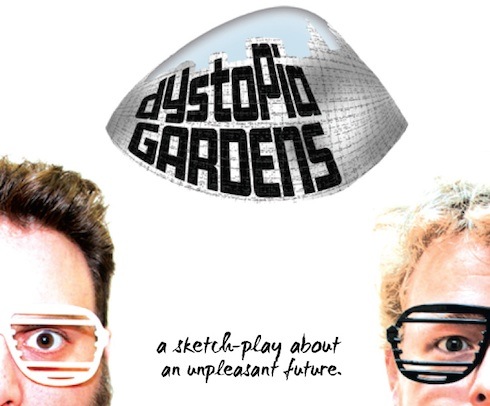Science fiction in theatre isn’t always an easy conceit to pull off. Implementing fantastic concepts into a simple minimalistic set requires a great deal of abstraction on the part of the writers, director and actors, and an obvious thematic route to employ is humor. After all, it seems absurd to be presenting the future on the stage of a small black box theatre, so why not make it absurd? Authors like Douglas Adams and Kurt Vonnegut reminded us that certain science fiction ideas can operate a lot like punch lines, and in live theatre this couldn’t be more true.
Simply appropriating science fiction into a stage comedy could be a disaster of good taste, however, current NYC Fringe Festival play Dystopia Gardens is completely in control of both its wit and science fiction ingredients. It deserves to be given an extended run at the NYC Fringe Festival, and I’ll be surprised if it doesn’t.
Dystopia Gardens is written, produced and performed by Jerry Sean Miller and Will Nunziata. The duo portrays every single part in the play, ranging from “The Leader” of a dystopian world, to a revolutionary character named Adam Applegate, to various low-level blue collar characters, to a charming young couple in early stages of their (government-mandated) romance. One of them even plays a talking robotic toilet. Most of these characters are made superficially distinct and are manifested by the two actors with the donning of a different wig, hat, or glasses. The constant swapping of silly costumes gives the play an immediate absurdist and madcap feel, which fits perfectly with the sensibilities of the actors. If Miller and Nunziata didn’t have the chops to pull off the various characters they’re portraying, this concept would fall flat. But they do, and it is hilarious.
Though initially seemingly a series of one-off bits, there is a narrative thread to the play, one that is helped along by pre-recorded video sequences where a narrator explains how the world was once a utopia and later became a wasteland. Miller and Nunizata borrow heavily from Logan’s Run, The Running Man and several other cinematic science fiction dystopias here, without actually ripping off the source material. In fact, the homages they employ are so deft that the references don’t come across as pandering one bit. My favorite example of this is explored in the idea that citizens who break the law are required to fight in a kind of gladiator contest called known only as “RPS.” I kept thinking I had missed a line in which is was revealed was “RPS” stood for, but then when it turns out it’s a acronym for “Rock, Paper, Scissors” the joke really hits home. It’s timed really well, and Miller and Nunizata, for the most part, don’t attempt to overly explain their jokes or linger too long on their good (and often silly) ideas.

What’s bizarre about the play is that it’s also partly a musical, and an impressive one at that. Though initially you’d be thrown off by the sudden introduction of singing into the narrative, by the end it doesn’t bother you one bit, and in fact, you’re looking forward to it. Dystopia Gardens also has elements of improv, further mixing stylistic genres. Yes, that’s right, a few of the bits in this play are totally unscripted. The reason this works and doesn’t distract from the overall premise is that initially you can’t tell the actors have left the script and you don’t realize the actors are screwing with each other. Again, some of this material could come across as hammy or gimmicky, but because the two performers are just so good at what they do, it doesn’t. The meta-element of improv comedy also works well in informing the disorganized and chaotic feel of the dystopian future the writers are depicting and mocking.
The last aspect that is surprising about the play is the fact that one of the stories contained within the larger narrative is actually moving, that of the aforementioned couple. When you see the play, you’ll be surprised that the line “it’s like we’re dancing” is initially presented as a joke, and later used as an almost tear-jerking bittersweet affirmation. How these guys were able to pull this off isn’t entirely clear to me because it’s as if they dropped a genuinely touching scene into the middle of an episode of Police Squad! or something. By all accounts of how dramatic structure works, they shouldn’t be getting away with this kind of emotional investment from the audience.
But if all kinds of advanced science will appear like magic to a lesser-evolved culture, maybe comedic science fiction theatre will seem like magic to an audience that has yet to experience it. Here’s hoping Dystopia Gardens grows and continues into a larger, more developed run.
Dystopia Gardens is part of the Fringe Festival in New York City and is playing at Dixon Place on 8/25/ at 7pm and 8/27 at 2pm. Tickets can be purchased here.
Ryan Britt is a staff writer for Tor.com.










